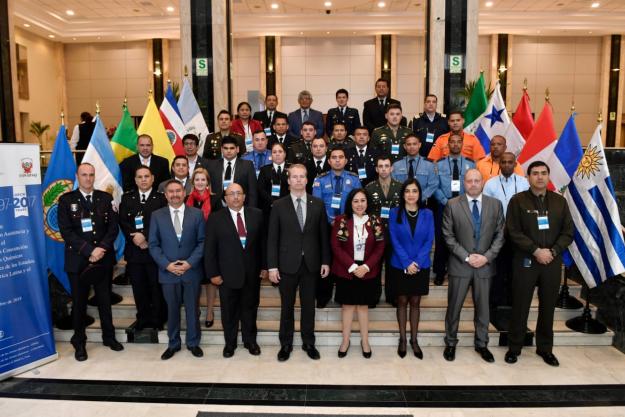
Participants at a training course held in Lima, Peru
THE HAGUE, the Netherlands – 13 September 2018 – Emergency response trainers from Latin America and the Caribbean developed skills to train responders specialised in incidents involving chemical warfare agents and toxic industrial chemicals, during a course held in Lima, Peru, from 3 – 7 September.
The training was run by the Organisation for the Prohibition of Chemical Weapons (OPCW), with the support of the National Commission for Chemical Weapons (CONAPAQ) and with technical backing from the Peruvian Centre for Chemical Information (CINQUI).
Head of the Peruvian National Authority to the Chemical Weapons Convention, Ambassador Cecilia Rozas Ponce de León, called on the participants, remarking, “It is paramount that the knowledge and protocols provided at this training complement the training and knowledge transfer activities that you design and implement in your home countries”.
OPCW’s Head of Assistance and Protection Branch, Mr Shawn DeCaluwe, underlined the importance of the train-the-trainers approach, noting that, “The success of this course will improve the sustainability of OPCW capacity building efforts that aim at strengthening regional response capabilities against chemical attacks and incidents involving toxic industrial chemicals in Latin America and the Caribbean”.
Twenty-six attendees represented the following OPCW Member States: Argentina, Brazil, Colombia, Costa Rica, Dominican Republic, Guatemala, Mexico, Panama, Paraguay, Peru, Spain and Uruguay.
Background
The course supports the implementation of Article X of the Chemical Weapons Convention (CWC), which concerns assistance and protection against chemical weapons.
The training-of-trainers approach helps ensure sustainable and efficient use of OPCW resources for capacity building. This course is part of the Organisation’s Instructor Development and Exchange Programme focusing on building and exchanging knowledge, skills and protocols in the area of assistance and protection.
As the implementing body for the Chemical Weapons Convention, the OPCW, with its 193 Member States, oversees the global endeavour to permanently eliminate chemical weapons. Since the Convention’s entry into force in 1997, it is the most successful disarmament treaty eliminating an entire class of weapons of mass destruction.
Over 96% of all chemical weapon stockpiles declared by possessor States have been destroyed under OPCW verification. For its extensive efforts in eliminating chemical weapons, the OPCW received the 2013 Nobel Peace Prize.
